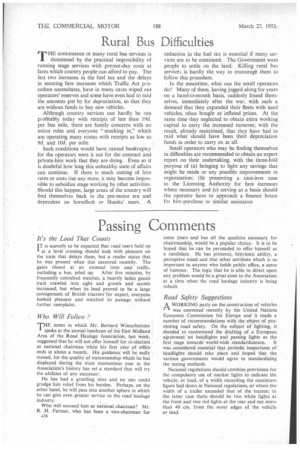Rural Bus Difficulties
Page 28

If you've noticed an error in this article please click here to report it so we can fix it.
THE continuance or many rural bus services is threatened by the practical impossibility -of running stage services with present-day costs at fares which country people can afford to pay. The last two increases in the fuel tax and the delays in securing fare increases which Traffic Act procedure necessitates, have in many cases wiped out operators' reserves and some have even had to raid the amounts put by for depreciation, so that they are without funds to buy new vehicles.
Although country services can hardly be run profitably today with receipts of less than 19d. per bus mile, there are family concerns with no union rules and everyone "mucking in," which are operating many routes with receipts as low as 9d. and 10d. per mile.
Such conditions would have caused bankruptcy for the operators were it not for the contract and private-hire work that they are doing. Even so it is doubtful how long this unhealthy state of affairs can continue. If there is much cutting of hire rates or costs rise any more, it may become impossible to subsidize stage working by other activities. Should this happen, large areas of the country will find themselves back in the pre-motor era and dependent on horseflesh or Shanks' mare. A reduction in the fuel tax is essential if many services are to be continued. The Government want people to settle on the land. Killing rural bus services is hardly the way to encourage them to follow this procedure.
In the meantime, what can the small operators do? Many of them, having jogged along for years on a hand-to-mouth basis, suddenly found themselves, immediately after the war, with such a demand that they expanded their fleets with used vehicles, often bought at inflated prices. At the same time they neglected to obtain extra working capital to carry the increased turnover, with the result, already mentioned, that they have had to raid what should have been their depreciation funds in order to carry on at all.
Small operators who may be finding themselves in difficulties are recommended to obtain an expert report on their undertaking, with the three-fold purpose of (a) bringing to light any savings that might be made or any possible improvements in organization; (b) presenting a cast-iron case to the Licensing Authority for fare increases where necessary and (e) serving as a basis should the operator have to approach a finance house for hire-purchase or similar assistance.




















































































